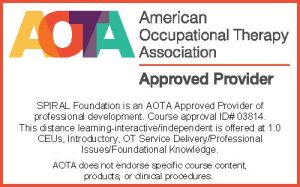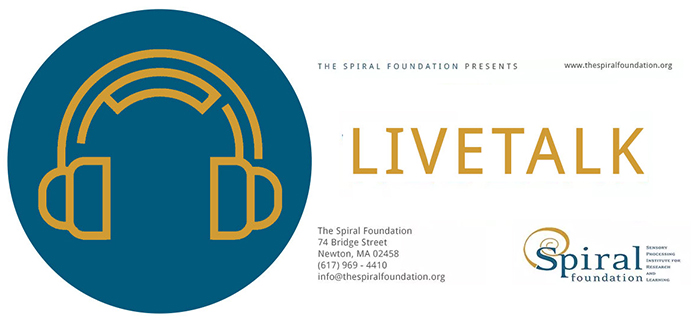A conversation with Yael Beth-Halachmi, M.A. Dance Movement Therapist
moderated by Erin Flynn, MS, OTR/L
Live: Thursday, August 25, 2022. 7-8pm EST
(recording will be available by Monday, August 29, 2022)
Description: “Music moves us together from birth. It’s the how of moving, not the what of moving that creates life” – Colwyn Trevarthen. Author Rhythms of Relating in Children’s Therapies.
Movement is a key component of Sensory Integration intervention. Yael Beth-Halachmi has developed an evidence-based intervention approach to marry Parent-Child Dyadic Model of therapy and Dance Movement Therapy in order to help build relationships and connections between parent and child and therapist. Yael will discuss her research with a Parent-Child ASD Program in Montreal and how she developed a series of Semi-Structured Play Interactions. These interactions have been developed into a deck of cards that can be used in intervention sessions and by parents at home. Videos will be used during the talk to illustrate how the interactions work.
Learning Objectives: By the end of the 2022 LiveTalk Series participants will be able to:
- Identify how to increase mental health knowledge for occupational therapy professionals across settings
- Recognize relationship and developmental based mental health models that compliment Sensory Integration intervention
- Select intervention modalities and models that support mental health while utilizing Sensory Integration principles
By the end of this discussion, part 7 of 10 in the 2022 LiveTalk Series, participants will be able to:
- Identify the underlying principles of Dance Therapy and the connection with Sensory Integration Therapy
- Describe Semi-Structured Playful Interactions
- Identify how to incorporate relational-dance therapy techniques into Occupational Therapy treatment sessions
About the Speaker: Yael has a Dance-Therapist certificate from INECAT, Paris, France (2003)and Seminar-Hakibuzim, Tel-Aviv, Israel (2007).She has graduated the Infant Parent Mental Health Certificate program (IPMH), at UMass, Boston in 2019. Her M.A. research project for the Music and Dance Academy in Jerusalem, Israel, under the title : “The Choreography of the Parent-Infant Relations ” was presented at the IARPP conference in Rome, 2016. Her experience as a therapist working with young ASD children and their families following the Haifa Dyadic Therapy Model integrated with her knowledge in Improvisational Dance and Movement Notation systems has set the ground for developing a model for relational-movement based observation and intervention called ‘Trio’. Her workshop: “Dance-in-Connection” will be presented as part of the WAIMH 2021 Congress. When facing challenges such as ; anxiety, depression or risk for delays in social-communicational development, Relational Dance-Therapy supports the parent-child relationship through movement, dance, play and talk, promoting the development of early joyful and safe relationships from the very beginning of life. Yael lives in Montreal and is a mother of three boys.
Disclosure: Ms. Beth-Halachmi has no financial relationship to disclose.
Course Level: Introductory
Audience: OT/ OTA, PT /PTA, SLP, psychologists, educators, parents
AOTA Areas: Occupational Therapy Service Delivery: Evaluation, Intervention and Outcomes. Foundational Knowledge: Social Determinants of Health
Contact Hours: This conversation is worth 1 contact hour or 0.1 AOTA CEUs. The full series has been approved for 10 contact hours or 1.0 AOTA CEUs.
Completion Requirements: To receive credit for this course you must listen to the discussion in its entirety and complete the accompanying assessment.
ADA/Section 504: If you require special accommodations, please contact the Spiral Foundation at admin@thespiralfoundation.org
Continuing Education: Occupational Therapy Practitioners/ Occupational Therapy Assistants: Foundation is an Approved Provider of Continuing Education for occupational therapists and occupational therapy assistants by the American Occupational Therapy Association. The assignment of AOTA CEUs does not imply endorsement of specific course content, products, or clinical procedures by AOTA.


